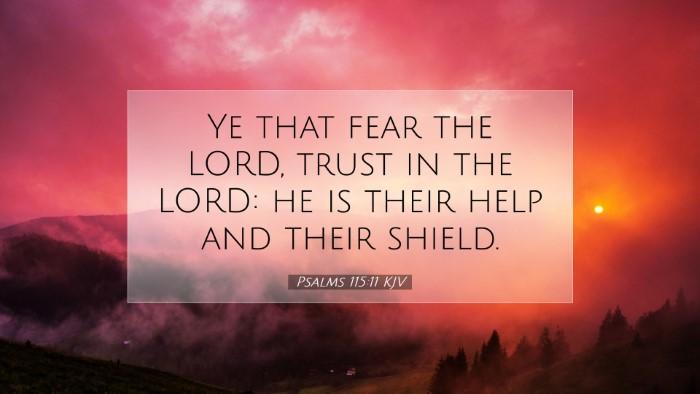Psalms 115:11 - Commentary
Verse: "You who fear the Lord, trust in the Lord; He is their help and their shield."
Introduction
The verse in Psalms 115:11 serves as a powerful reminder of the faithfulness of God and the necessity of trust in Him for those who revere Him. It encourages believers to rely on God as their protector and support. Various respected commentators provide insights that help deepen our understanding of this verse, offering both theological and practical perspectives for Christian living.
Matthew Henry's Insights
Matthew Henry emphasizes the importance of the fear of the Lord. He explains that this fear is not a mere dread, but a profound reverence and awe for the divine nature and authority of God. To fear the Lord means to recognize His greatness and holiness, leading to a life of trust and reliance on Him.
Henry notes that trusting in the Lord involves a conscious choice to look away from worldly distractions and difficulties, focusing instead on God's capabilities and promises. This trust is rewarded through divine assistance and protection, which he describes as God being both "help" and "shield" to the faithful.
Furthermore, Henry points out that this verse serves as an encouragement for those who may feel weak or powerless, reminding them that their strength comes from God. He asserts that such individuals can find solace in the assurance of God's ever-present help.
Albert Barnes' Perspective
Albert Barnes discusses the two essential terms mentioned in this verse: "help" and "shield." He articulates that to call God our "help" is to acknowledge His role as a source of support in times of need. Barnes elaborates that this divine help is not passive but is actively engaged in the lives of believers, providing strength and sustenance.
When referring to God as a "shield," Barnes highlights the idea of protection from harm. This imagery evokes strength and security, as a shield serves to guard against various threats. He draws attention to the assurance that those who fear the Lord can find refuge in God's power and defense in times of distress.
Moreover, Barnes emphasizes the communal aspect of the verse. While it addresses individuals who fear the Lord, it also speaks to the collective experience of God's people, united in their trust in Him. This reflection invites believers into community, encouraging them to support one another in their reliance on God.
Adam Clarke's Commentary
Adam Clarke provides a deeper theological analysis of the terms "fear" and "trust." He interprets fear as a profound respect and acknowledgment of God's sovereignty. Clarke argues that genuine fear of the Lord will naturally lead to a greater reliance upon Him, fostering a relationship built on faith and love.
Clarke also points out a possible way to interpret this verse as an invitation to enter into a covenantal relationship with God. Trusting in the Lord becomes a reciprocal response to His faithfulness. Clarke stresses that this relationship is rooted in the promises of God, which should inspire a deep confidence among His followers.
Additionally, Clarke reflects on the universal applicability of this verse. He notes that whether one is facing personal trials or national calamities, the principle remains the same: we are to turn to God for help and guidance. Such an act of faith not only reinforces individual belief but strengthens the community's reliance on divine providence.
Theological Implications
This verse encapsulates several crucial theological themes:
- The Nature of God: God is presented as both helper and protector, emphasizing His intimate care for His people.
- Human Response: The condition to fear and trust the Lord reflects the duality of God's nature and human agency in the covenant relationship.
- Community and Individuality: While the verse addresses individuals, its call to collective reliance on God underscores the interdependence of believers.
Practical Application
For pastors and students, this verse serves as a foundational reminder to encourage their congregations in both their personal faith journeys and communal worship experiences. The importance of instilling a proper fear of the Lord cannot be overstated, as it leads to a life marked by faith and trust in God's provision.
The assurance of God as help and shield can be a source of comfort for those facing trials, invitations for reflection during moments of doubt, and encouragement to pray and seek divine guidance.
Moreover, theologians and scholars might explore the implications of this verse historically, doctrinally, and spiritually, considering its role within the broader context of the Psalms and the entire biblical narrative. Understanding the cultural backdrop of Israel’s faith in God as the ultimate protector enriches their insights into contemporary relevance.
Conclusion
Psalms 115:11 encapsulates a powerful message about the necessity of fearing the Lord and placing trust in Him. Through the insights of commentators such as Matthew Henry, Albert Barnes, and Adam Clarke, we see a rich tapestry of understanding that combines divine support, human responsibility, and the communal aspects of faith. As believers meditate on this verse, they are invited into a deeper relationship with God—a relationship characterized by unwavering trust in His enduring faithfulness.


